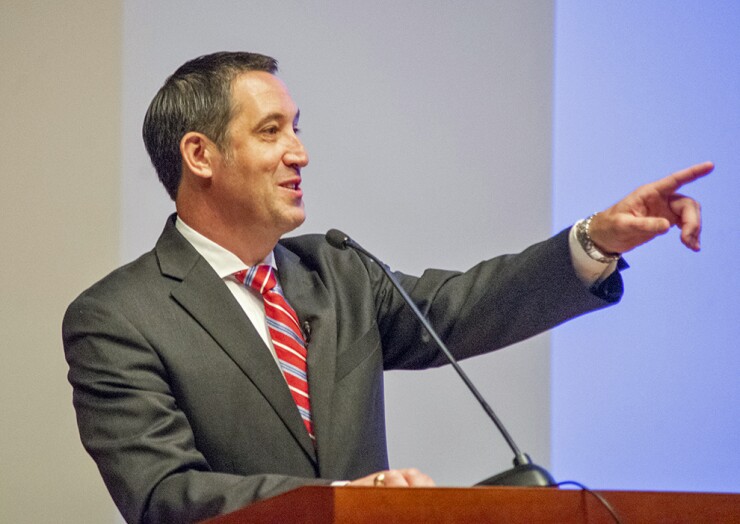Bountiful revenue will probably keep Texas out of the short-term note market for a second year in a row, delaying a test on how pro-firearm policies that have sidelined a few big underwriting firms in Texas could impact pricing, according to Glenn Hegar, the state’s comptroller.
“This year between the dollars we have in the treasury as well as federal money that’s come down in combination, I don’t think today we’d be issuing a TRAN (tax and revenue anticipation note), Hegar said in an interview Wednesday with The Bond Buyer, pointing out that tax revenue was up more than 20% over peak pre-pandemic levels.

He acknowledged that while having fewer players in the market potentially increases the cost of issuance, the absence of bigger bidders could spark competition from smaller investment banks.
“A disruption in the current system may bring opportunities for others to fill a void,” he said. “We're seeing whether that will play out or not. I'm one that just kind of looks at if there's a crisis to one there’s maybe an economic opportunity for another.”
Some winning bidders for the 3.5-times oversubscribed $7.2 billion of TRANs Texas sold in 2020 — the state's last TRAN sale —have been less active in the state’s debt market since September.
JP Morgan Chase, which won $4.5 billion of the TRANs, said in a statement in March: “While our business practices are not in conflict with these laws, we have decided against bidding on most contracts with Texas public entities right now until it becomes more clear how these laws will be interpreted and enforced.”
Citigroup, which won $300 million of the TRANs, saw its
Although the bank has verified that it does not discriminate against firearms, its participation in bond issues in Texas remains controversial given a policy it announced in 2018 that requires new retail sector clients to adhere to “best practices” of prohibiting firearm sales to someone who has not passed a background check or is under age 21, and not selling bump stocks or high-capacity magazines.
In a letter to the Texas attorney general, a firearm industry group objected to Citigroup winning a local school bond issue last fall. Meanwhile, the bank will be heading a $1.19 billion
Goldman Sachs, the winner of $165 million of the TRANs, has stayed out of the Texas muni market since September, Refinitiv data showed.
Bank of America, which has largely stepped away from Texas munis, won the biggest chunk — $3.19 billion — of the state’s $8 billion TRANs issue in 2019.
Hegar said the law does not require him to retain a list of companies that have verified their position on firearms, unlike another law, which also took effect Sept. 1, that has similar verification requirements for companies that might be
The comptroller has sent letters to almost 170 U.S. and foreign financial companies, including JP Morgan Chase, UBS Group, and Wells Fargo, asking them to clarify their fossil fuel investment policies and procedures and provide a list of mutual funds or exchange-traded funds in their portfolios that prohibit or limit fossil fuel investment. Under the law, Hegar is required to compile a list of boycotting companies for state disinvestment purposes.
Hegar said companies may be presenting their policy positions one way in Texas and in a completely opposite way in California and that more states will be taking a look at these policy issues.
“Companies are going to have to figure out what are their policies. The right question is how engaged should companies be in the political process?” Hegar said, who was interviewed in Austin before his speech to the Bond Buyer Texas Public Finance Conference. “Are they here to do business or are they here to be a politician? We never had that in this country before to this level and to this degree where CEOs act like they are the policy makers.”
Texas may open another new frontier when it comes to company policies regarding abortion. In response to Citigroup’s announcement in a March 15 proxy statement that it will begin to provide travel benefits for employees seeking reproductive healthcare, a Texas lawmaker said he will introduce a bill “that bars local governments in Texas from doing business with any company that pays the abortion related expenses of its employees or that provides abortion coverage as an employee benefit – regardless of where the employee is located of where the abortion is performed.”
As of Sept. 1, Texas banned abortions after a fetal heartbeat is detected and allowed private citizens to sue an abortion provider or person who aids a woman in obtaining an abortion.





